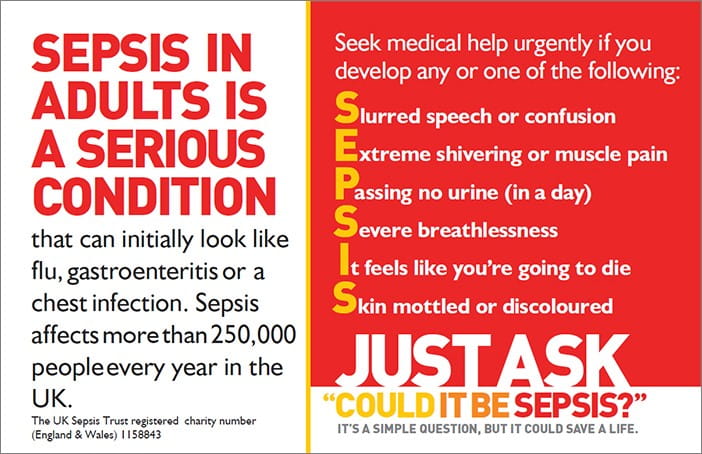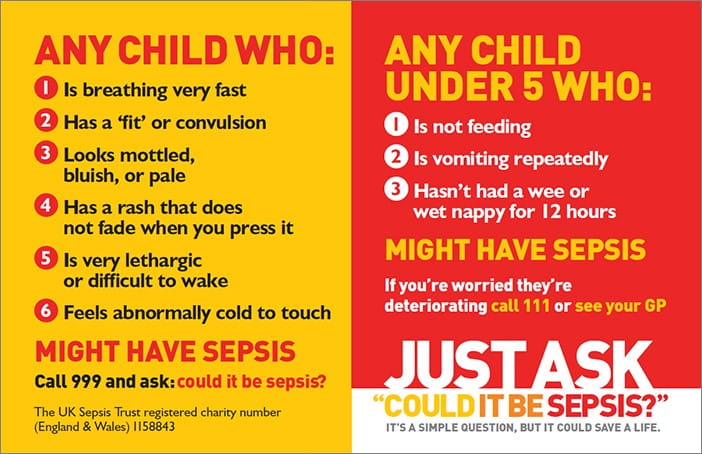Are you sepsis aware?

19 Sep 2018
Melissa Mead
Up to 44,000 people in the UK die every year from sepsis and as many as 250,000 people are affected by the condition every year in the UK. At the UK Sepsis Trust, we are passionate about raising awareness of this potentially life-threatening condition. Previously known as blood-poisoning, sepsis is the body’s reaction to an infection, which causes it to attack its own tissues and organs. The good news is that sepsis can be treated effectively with antibiotics if is caught promptly.
Raising awareness of the condition can and does save lives. People with dental infections are an at-risk group so it is imperative that those professionals who are caring for patients are able to spot the signs and symptoms of sepsis and act quickly. With dental infection being a risk factor, it is important to know what ‘worse’ looks like.
So what causes sepsis?
Normally your body’s immune system responds to infection by working to fight any germs (bacteria, viruses, fungi), or to prevent infection. However, for reasons we do not fully understand, sometimes the immune system goes in to overdrive. It can happen as a response to any injury or infection, anywhere in the body. It can result from:
•A chest infection like pneumonia.
•A urine infection (UTI).
•A problem in the abdomen like gastroenteritis, or problems like a burst ulcer or a hole in the bowel.
•An infected cut or bite.
•A wound from trauma or surgery.
•A leg ulcer or cellulitis.
•A dental infection.
Sepsis can be caused by a huge variety of different germs, like streptococcus, e-coli, MRSA or C Diff. Most cases are caused by common bacteria, which normally don’t make us ill.
Sepsis is a major cause of death in the UK and 14,000 sepsis-related deaths are preventable. Patients with known infections are vulnerable, and their sepsis symptoms are often misinterpreted with other self-limiting conditions such as flu or gastroenteritis, potentially resulting in delayed treatment.
When treating younger patients, language and comprehension can be a communication barrier. Children can often compensate well during a disease process like sepsis. This means that subtle changes can be missed until they suddenly become extremely unwell. It is so important to trust your instincts.
Signs and Symptoms
As a healthcare provider, it is important that you, your staff and patients are aware of the signs and symptoms and are able to seek the appropriate medical care without delay, when infection is diagnosed. Early recognition, diagnosis and treatment dramatically improves outcomes from sepsis. These are the symptoms to be aware of:
Raising awareness of sepsis in your dental setting, or operating theatre, not just amongst staff but also patients, will save lives. At the UK Sepsis Trust our goal is to end preventable deaths from sepsis and improve outcomes for sepsis survivors.
With help from supporters we are putting sepsis on the national and global agenda. We encourage you to think about sepsis when you are caring for a patient that you suspect or already has an infection. If you are unsure, always ask: could it be sepsis?
In September with the help of NHSBSA there will be a dental specific awareness poster being disseminated, please do download it and display it in your dental practice or hospital ward.
Melissa Mead
Melissa Mead works for the UK Sepsis Trust and has campaigned tirelessly since the preventable death of her one-year-old son William, in December 2014. Melissa hadn’t heard of sepsis before William died, this is something she wants to change for all the general public. Together with the UK Sepsis Trust they work with large stakeholders, like RCS to ensure that this vital information reaches the people who really need it. For more information or to find out how you can get involved please contact Melissa on: Melissa@sepsistrust.org
Join the discussion
Add your comments to the site using Disqus.
Sign up below by adding a name, email address and password (click on the Discussion box to reveal the 'Name' field). Or log in using your social media profile.
After signing up, you can start commenting and won't have to log in to Disqus again - you don't even need to log in to your RCS account.


